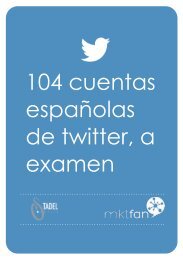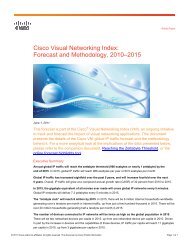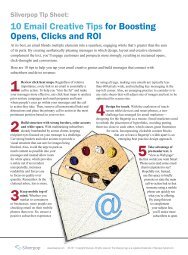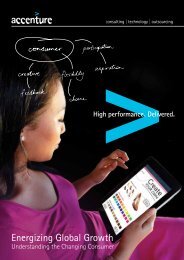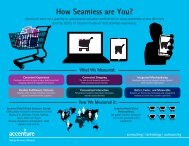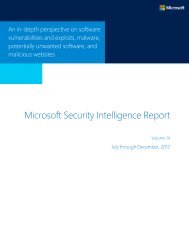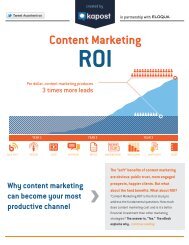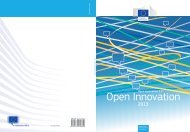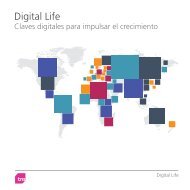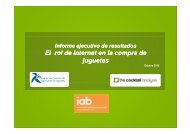How Teachers Are Using Technology at Home and in ... - Prisa Digital
How Teachers Are Using Technology at Home and in ... - Prisa Digital
How Teachers Are Using Technology at Home and in ... - Prisa Digital
Create successful ePaper yourself
Turn your PDF publications into a flip-book with our unique Google optimized e-Paper software.
Despite their heavy tech use, 42% of AP <strong>and</strong> NWP teachers say their students usually know more than<br />
they do when it comes to us<strong>in</strong>g new digital technologies. Just 18% feel they know more than their<br />
students. This is despite the fact th<strong>at</strong> over half of AP <strong>and</strong> NWP teachers (56%) are “very confident”<br />
when it comes to learn<strong>in</strong>g how to use the l<strong>at</strong>est digital tools, <strong>and</strong> another 39% say they are “somewh<strong>at</strong><br />
confident.”<br />
The basics of the survey<br />
These are among the ma<strong>in</strong> f<strong>in</strong>d<strong>in</strong>gs of an onl<strong>in</strong>e survey of a non-probability sample of 2,462 middle <strong>and</strong><br />
high school teachers currently teach<strong>in</strong>g <strong>in</strong> the U.S., Puerto Rico <strong>and</strong> the U.S. Virg<strong>in</strong> Isl<strong>and</strong>s, conducted<br />
between March 7 <strong>and</strong> April 23, 2012. Some 1,750 of the teachers are drawn from a sample of advanced<br />
placement (AP) high school teachers, while the rema<strong>in</strong><strong>in</strong>g 712 are from a sample of N<strong>at</strong>ional Writ<strong>in</strong>g<br />
Project teachers. Survey f<strong>in</strong>d<strong>in</strong>gs are complemented by <strong>in</strong>sights from a series of onl<strong>in</strong>e <strong>and</strong> <strong>in</strong>-person<br />
focus groups with middle <strong>and</strong> high school teachers <strong>and</strong> students <strong>in</strong> grades 9-12, conducted between<br />
November, 2011 <strong>and</strong> February, 2012.<br />
This particular sample is quite diverse geographically, by subject m<strong>at</strong>ter taught, <strong>and</strong> by school size <strong>and</strong><br />
community characteristics. But it skews towards educ<strong>at</strong>ors who teach some of the most academically<br />
successful students <strong>in</strong> the country. Thus, the f<strong>in</strong>d<strong>in</strong>gs reported here reflect the realities of their special<br />
place <strong>in</strong> American educ<strong>at</strong>ion, <strong>and</strong> are not necessarily represent<strong>at</strong>ive of all teachers <strong>in</strong> all schools. At the<br />
same time, these f<strong>in</strong>d<strong>in</strong>gs are especially powerful given th<strong>at</strong> these teachers’ observ<strong>at</strong>ions <strong>and</strong> judgments<br />
emerge from some of the n<strong>at</strong>ion’s most advanced classrooms.<br />
In addition to the survey, Pew Internet conducted a series of onl<strong>in</strong>e <strong>and</strong> offl<strong>in</strong>e focus groups with middle<br />
<strong>and</strong> high school teachers <strong>and</strong> some of their students <strong>and</strong> their voices are <strong>in</strong>cluded <strong>in</strong> this report.<br />
The study was designed to explore teachers’ views of the ways today’s digital environment is shap<strong>in</strong>g<br />
the research <strong>and</strong> writ<strong>in</strong>g habits of middle <strong>and</strong> high school students, as well as teachers’ own technology<br />
use <strong>and</strong> their efforts to <strong>in</strong>corpor<strong>at</strong>e new digital tools <strong>in</strong>to their classrooms.<br />
About the d<strong>at</strong>a collection<br />
D<strong>at</strong>a collection was conducted <strong>in</strong> two phases. In phase one, Pew Internet conducted two onl<strong>in</strong>e <strong>and</strong> one<br />
<strong>in</strong>-person focus group with middle <strong>and</strong> high school teachers; focus group participants <strong>in</strong>cluded<br />
Advanced Placement (AP) teachers, teachers who had particip<strong>at</strong>ed <strong>in</strong> the N<strong>at</strong>ional Writ<strong>in</strong>g Project’s<br />
Summer Institute (NWP), as well as teachers <strong>at</strong> a College Board school <strong>in</strong> the Northeast U.S. Two <strong>in</strong>person<br />
focus groups were also conducted with students <strong>in</strong> grades 9-12 from the same College Board<br />
school. The goal of these discussions was to hear teachers <strong>and</strong> students talk about, <strong>in</strong> their own words,<br />
the different ways they feel digital technologies such as the <strong>in</strong>ternet, search eng<strong>in</strong>es, social media, <strong>and</strong><br />
cell phones are shap<strong>in</strong>g students’ research <strong>and</strong> writ<strong>in</strong>g habits <strong>and</strong> skills. <strong>Teachers</strong> were asked to speak<br />
<strong>in</strong> depth about teach<strong>in</strong>g research <strong>and</strong> writ<strong>in</strong>g to middle <strong>and</strong> high school students today, the challenges<br />
they encounter, <strong>and</strong> how they <strong>in</strong>corpor<strong>at</strong>e digital technologies <strong>in</strong>to their classrooms <strong>and</strong> assignments.<br />
p e w<strong>in</strong>ter n e t .o r g 7



